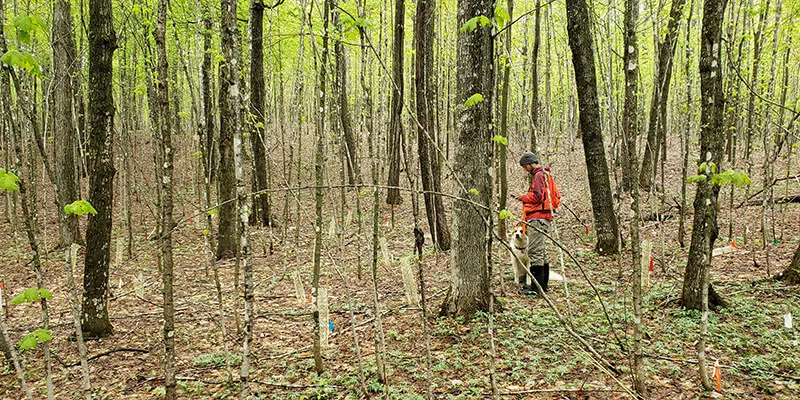The University of Vermont received more than $1.9 million from the National Science Foundation as part of a regional grant with the University of Maine and University of New Hampshire. More than 40 researchers at the partnering universities will compile data to better assess, understand, and forecast complex forest landscape changes for this four-year, multidisciplinary project led by the University of Maine.
The project, awarded a total of $6 million, brings together expertise and facilities from the three institutions to build a digital framework that integrates, analyzes, and visualizes complex data streams across the region’s vast forest. This novel approach will contrast forest information, ownership, management units, and underlying ecology to improve our understanding of northern forest ecosystem resiliency in the face of change.
“Forests are changing rapidly, while the technology to better monitor them is, too,” says Aaron Weiskittel, professor of forest biometrics and modeling at the University of Maine, who is leading the project. “I hope this project can help support and sustain northern New England’s unique working forests, which many rural communities rely on for their livelihoods.”
Local and regional communities depend on the health of forest ecosystems to support biodiversity, conservation, recreation, and a forest-based workforce. The region’s forests are dynamic and diverse due to complex factors, including changing environmental conditions, varying management objectives related to mixed land ownership, and natural disturbances.
“Northern forests, including those forming the fabric of Vermont’s culture and livelihoods, face a highly uncertain future due to changing climate and non-native invasive species,” says Anthony D’Amato, professor of silviculture and applied forest ecology in the UVM Rubenstein School of Environment and Natural Resources, who is leading the University of Vermont portion of the project. “The work by UVM and our partners will develop and advance a critical framework for detecting forest processes and change and assist in developing adaptation strategies to address global change impacts.”
D’Amato will manage key study areas at UVM’s Washington Forest in Orange County, Vermont and at Victory State Forest in Essex County.
“In Vermont, we will use northern Vermont forests and critical research and stakeholder partnerships in all three states to increase research capacity in historically understudied, yet ecologically and economically important forest-dependent regions, such as the Northeast Kingdom,” says D’Amato who directs the UVM forests.
Despite advances in technology and better acquisition of forest-related information, critical near real-time and high-resolution data on forest health or tree species composition remains patchy and highly variable.
“Traditional ground-based forest inventory data is expensive to collect and often out of date,” says Weiskittel, who directs the Center for Research on Sustainable Forests at the University of Maine. “Satellites and other advanced technologies offer numerous advantages, but translating that data into useful information is not an easy task.”
The project will build on expertise and facilities across the three universities to integrate emerging computational, monitoring, remote sensing, and visualization technologies into a digital framework. The framework will create a natural laboratory for scientific experimentation by providing comprehensive spatial and temporal measurements of the forest that can be readily accessed by scientists, land managers, and policymakers.
“Leveraging Intelligent Informatics and Smart Data for Improved Understanding of Northern Forest Ecosystem Resiliency (INSPIRES)” also aims to strengthen workforce development and broaden participation in STEM education, particularly among students with diverse backgrounds, skills, and interests.
INSPIRES will draw from a variety of established programs and disciplines, including data science, ecology, engineering, computer programming, and communications.
Faculty and students from the three institutions will collaborate on the development of a virtual, regional Complex Systems Research Institute that will facilitate ongoing analysis of natural ecosystem integrity and resilience from multiple scientific perspectives. The institute will include large-scale simulations of alternative futures that take into account climate variability, atmospheric pollution, land use, and changes in regulatory policies.
Along with Weiskittel and D’Amato, Scott Ollinger, professor of natural resources and the environment at the University of New Hampshire, is a lead co-investigator. Other University of Vermont researchers involved in the project include: Carol Adair (Rubenstein School), Aimée Classen (Rubenstein School), Donna Rizzo (Civil and Environmental Engineering), Regina Toolin (Education), James Bagrow (Mathematics and Statistics), and Jane Foster (Rubenstein School).
Funding for the project comes from the National Science Foundation’s EPSCoR Research Infrastructure Improvement Program. The Established Program to Stimulate Competitive Research (EPSCoR) promotes scientific progress nationwide. The program’s Track-2 Focused EPSCoR Collaborations build interjurisdictional, collaborative teams of EPSCoR investigators in scientific focus areas consistent with NSF priorities. The STEM research and education activities seek to broaden participation through strategic inclusion and integration of different types of individuals, institutions, and sectors throughout the project.
